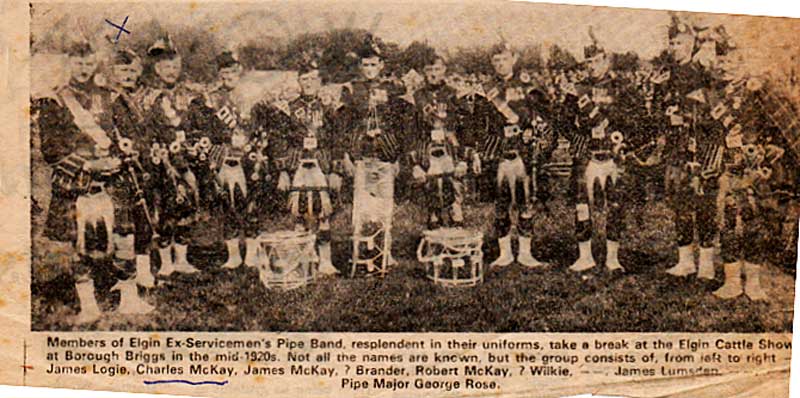Reader, Fiona Stephen, has been in touch with some fascinating information about three members of her family who fought at the Battle of Magersfontein. Fiona’s information shows us that this iconic battle, immortalised in pipe music, is really not as long ago as we think.
The battle was fought on December 11, 1899 near the town of Kimberley in South Africa and was one of the early skirmishes of the Second Boer War (October 1899-May 1902). It ended in defeat for the British. As a teenager, John MacLellan, Dunoon, had joined the Highland Light Infantry and fought at the battle. He later composed the lovely eponymous retreat march. The full story of the battle was posted on Bagpipe.News last November.
During family research, Fiona discovered that two Mackay brothers from Elgin were killed at this battle. John and Alex were with the 2nd Bn. the Seaforths, and both were pipers. “Fortunately,” says Fiona, “a third brother – my grandfather –survived.
Fiona goes on: “There were actually four brothers who all became pipers in the Seaforths. I have a newspaper cutting [see above – Editor] from December 30, 1899 – the Northern Scot – that carries a report about the death at the battle of the eldest brother, John. His brother, Alex’s death in the same engagement had been reported the week previously.
“My grandfather, the next brother down, survived the battle, and on his return to Elgin joined the reserves. He and the fourth brother, James – who was too young for the Boer War but served in the First World War – are pictured together in this (not too clear) press cutting, still piping.
“A poem for Alex was written by the local dominie [schoolmaster – Editor] and published in the Northern Scot many years later:”
In Memoriam
So gently, so kindly, so manly so brave,
Alas, for the far off South African grave,
Alas, for the day when relentless and keen,
The swift bullet found him at Magersfontein.
How pleasant the pipe notes in Pluscarden’s glades,
By Miltonduff’s stream, through Manbeen’s leafy shades,
And the children he loved, ran with rapturous cry,
To listen to the piping of Alick Mackay.
Now silenced the music, ‘mid discords of war,
Now sleeps the musician, in desert afar,
‘Mong stones of the veldt, ‘neath the sun and the rain,
Where Modder flows on, to the far distant main.
But when zephyrs of evening, awake on the hill,
I shall hear his sweet pibroch, awake in them still,
And think, when through woodlands, the winter winds sigh,
‘Tis the coronach crying for Alick Mackay.
To the Queen and her cause thou were true to the core,
Thou gavest a life – what can noblest give more,
May I, when death’s pallor steals over my brow,
To my king and my cause be found loyal as thou.
Our grateful thanks go to Fiona for sending us this information. If any other readers have unearthed similar interesting family anecdotes please don’t hesitate to contact us.
Piping historian, Jeannie Campbell’s latest book – a comprehensive history of pipe bands – is at the final stages of pre-production. Bagpipe.News has had a sneak preview of the tome and was impressed with the sheer amount of detail in the book.
Running to 850 pages, the book – titled simply Pipe Bands – chronicles the early beginnings of the pipe band movement through to the first civilian bands, school bands, Boys’ Brigade bands, ladies bands and juvenile bands. Jeannie has detailed the global spread of the art in chapters covering Europe, Canada, USA, New Zealand, Ireland and so on. It is a phenomenal piece of research and, clearly, the book will be of interest to all pipe band enthusiasts. It will undoubtedly prove to be a ‘go to’ reference book for the pipe band world.
Jeannie tells us she expects the book to be available in the coming weeks.
One nugget jumped out at us. Jeannie quotes Seumas MacNeill writing in the July 1949 edition of the Piping, Drumming and Highland Dancing Journal: “One might ask then,” wrote Seumas, “why it is that any piper stays in a band after his first training stage has been completed. It may be for business reasons, or because of an army career, or because of a job in the police or the distillery, but probably the main reason is purely social.
“A band is great fun, and the friendship between members of a band holds firmly. But at heart, every piper is an individualist, as can be seen at any band practice, where each likes to get away on his own to have a tune. If the social side and the piping can be supplied without the band, pipers are completely happy.
“The distinction between ‘pipers’ and ‘bandsmen’ is in reality quite simple. All pipers are individual pipers at heart. The only ‘bandsmen’ are drummers.’”
• Do you agree? Is it still the case that the only ‘bandsmen’ are drummers? Contact us in the usual way.






